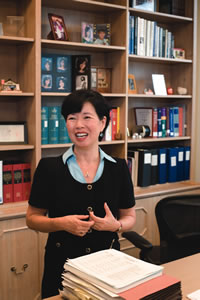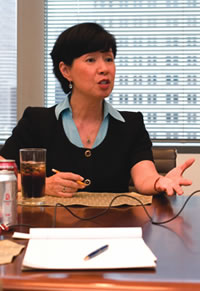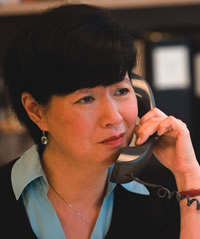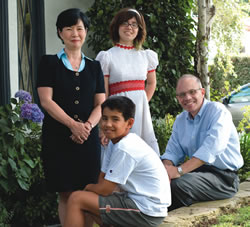Fujie: high energy at the helm
By Diane Curtis
Staff Writer
 |
| (Click to Enlarge) |
Holly Fujie sits in her 14th floor law office with a view of downtown Los Angeles opposite a Notre Dame Law School student who has come for a mock interview, a service Fujie regularly provides as a mentor to young Asian Americans.
“If, at the end of the interview, your mother would have been proud of the way you acted, you didn’t get the job,” Fujie, a shareholder at Buchalter Nemer, tells Bora Chon, a Korean American who had contacted Fujie through a friend who had worked at Bet Tzedek, where Fujie is on the board. “You have to fight the stereotype of the quiet Asian woman.”
“It was very helpful,” Chon said of her hour with Fujie, concluding that, alas, her mother would have been proud. “Yesterday morning was my first round of interviews. I won’t be expecting callbacks.”
Fujie told Chon that she knows what Chon is going through because she has been there herself, and it is easy to see that this effort at inclusiveness, at having people, as well as organizations, meet their potential is a theme she will emphasize in her role as the State Bar’s 84th president — the third woman to take the helm of the 217,000-member organization and the second Asian American.
 |
| (Click to Enlarge) |
She wants people to know the good things that lawyers do. “It bothers me a lot that lawyers do so many great things and don’t get a lot of publicity,” Fujie said while meeting members of the California Young Lawyers Association, referring in this instance to the many pro bono efforts of lawyers. Another of her major goals as president is to involve lawyers who are active in such minority bar associations as the Asian Pacific American Bar Association (APABA), where she is an advisory board member, in the State Bar. She also wants to spark young lawyers’ enthusiasm about their profession and interest them in the activities of the State Bar. She has a reverence for lawyers that she would like others to share. “From the moment you take the oath, you gain credibility” — a credibility that requires living up to, she says. She also wants to promote diversity, something she has done in myriad bar associations, wants to improve orientation for new board members and ensure efficient bar operations.
Already Fujie has found that her higher profile alone can help achieve her goals. At an APABA meeting, she says, an Asian American lawyer came up to her and confided: “I never thought of doing something with the State Bar or a mainstream bar until I saw that you were elected president.”
“The idea that I can inspire people just about blows me away,” says Fujie. “For Asians, it’s a big thing for me to be president. I want to celebrate that.”
A third-generation Japanese American, Fujie is proud of her heritage. Still, she is aware of the stereotypes that can hold people back, including that of the reticent Asian. Few people who know her, including her husband, would describe Fujie as retiring. “She’s very pretty, very bright, very engaging, and she talks a lot,” says Lee Cotugno, her husband of 30 years who was her moot court adviser at Boalt Hall School of Law at UC-Berkeley. Cotugno is a partner with Beverly Hills’ Kalisch, Cotugno & Rust, where he practices mostly employment law. The couple married the day after she graduated from Boalt and have two children, Sabrina, 18, and Tom, 11.
Fujie’s friends and colleagues also remark on her sense of humor — she delivered a slew of one-liners in her candidate’s speech for the bar presidency — energy, work ethic, tenacity, organization, integrity and sharp intelligence.
Fujie, 52, grew up in Oakland with an older sister, younger brother, beloved grandparents, tax accountant-turned-insurance agent father and executive secretary-turned-tax accountant mother. The public schools she attended had predominantly African American students, and while there was some taunting because of race (“They called me ‘Ching Ching Chinaman’”), all her friends were black. The neighborhood could be tough, and Fujie remembers frequent fights and a fire being started at school every Monday morning by students who didn’t want to be there. “You learned how to cope with all sorts of situations,” she says. “Growing up the way I did — where you had to fight for what you got — was good training.” She skipped kindergarten because she could read when she first went to school and she skipped another grade when she was put into a two-grade combination class. She graduated from UC-Berkeley at 19 with a double major in political science and economics and was 22 when she got her law degree. “Now I say, ‘Why was I in such a hurry’? But for me, it was right.”
Fujie always worked as she was growing up — babysitting, serving (and getting all the free ice cream she could eat) at Foster’s Freeze, tutoring, teaching. And she admits to being partial to law students or graduates with that kind of work background and ethic.
She views her upbringing as “a good cultural experience” that gave her a great gift: “I can get along with anybody. I’ve never felt uncomfortable with anybody.”
That doesn’t mean she cheerfully accepts all that has happened. Both her parents’ families were interned during World War II, first being sent to the Tanforan Race Track in San Bruno, where they lived in the stables, and then to Topaz Camp in Delta, Utah, where 8,000 men, women and children were detained. Her grandfather was taken away by the FBI in December 1941, and the family didn’t know where he was for a year. “It makes you very conscious of civil rights,” Fujie says.
That consciousness greatly defines the State Bar’s new president. She is keenly aware of the honor and responsibilities that come with breaking barriers. When asked if she is a feminist, there is no hesitation: “Absolutely,” she declares. “I believe in the empowerment of women — that we develop and are allowed to develop and use our talents and abilities to the greatest extent possible.” At the same time, she wants to honor differences. “We want to be equal under the law, but we don’t want people to deny their heritage.”
Mia Yamamoto, a Los Angeles criminal defense attorney and a longtime friend who knows Fujie through the Multicultural Bar Alliance and other women’s and community groups, says Fujie has reached out in a way that many in the minority bar associations have not. “She’s been much more in the majority community and bringing our points of view and perspectives and issues to the larger bar,” says Yamamoto. “She’s an amazing advocate and a really sensible person.” Yamamoto describes herself as a “wild-eyed radical” who protests and rails against injustice and often cheers on those who take to the streets. Her friend, on the other hand, works more quietly within the system. “She probably changes more hearts and minds than I do,” Yamamoto says. “She works with people rather than challenging them.”
Mitchell Kamin, executive director of Bet Tzedek, concurs. “She really is someone who relates to all people in a kind and humanistic way, and I really respect that. She’s very humble and very accomplished. It’s kind of a perfect combination.”
 |
| (Click to Enlarge) |
Fujie worked at four firms before she joined Buchalter Nemer in 1991 — Adams, Duque & Hazeltine; Morgan, Lewis & Bockius; Rogers & Wells; and Rosen, Wachtell & Gilbert, where she was a partner. When that firm disbanded, most of its partners moved to Buchalter. She specializes in insurance industry litigation, including coverage issues, bad faith, broker representation, policyholder representation, fraud and reinsurance. “I’m glad she’s on my side,” says attorney David Pasternak, who met Fujie when she represented him in a receivership case about 10 years ago. “Tenacious. I think that’s the word that comes to the forefront. Very sharp. She’s someone who has succeeded by working very hard.” In that first case, Fujie collected $3 million in an appeals court decision that was published.
Fujie says she had intended to practice tax and trust law, in part because her mother was a “crazed” tax accountant who loved her work so much that she kept the tax code in her bedroom and could best just about anybody on tax questions. Fujie did not consider litigation because “I didn’t think of myself as being articulate enough,” she recalls. But she found she wasn’t interested in tax law and came to appreciate — and do well — in the litigation process. “I love crafting an argument.” She’s also found that “there’s never the same problem twice. You have to be a little nimble.” Fujie has obtained numerous summary judgments for defendants and successfully argued appeals before the Ninth Circuit Court of Appeal and the California District Courts of Appeals. She is on the board of directors of the Los Angeles chapter of the Federal Bar Association.
Mike Terrell, an assistant U.S. attorney who used to work with Fujie at Rosen Wachtell and has known her for 23 years, said she’s changed in the sense that she’s taken on more professional and personal responsibility with law firm partnerships and children. But other qualities haven’t changed, he says: “her friendliness, her integrity, her work ethic. She’s one of the hardest working people I’ve ever met. I don’t know what drives her, but I know she has the inner drive to do the best at whatever she’s working on. She’s not the type of person who settles on doing something in a mediocre fashion just to get it done . . . She’s just a high-quality person in every facet of her life.”
At the State Bar, Fujie was chair of the Regulation, Admissions and Discipline Oversight Committee and acted as a liaison to the Litigation, Intellectual Property and Inter-national Law sections. She served on the bar’s Pipeline Task Force and is also on the board of directors of the California Bar Foundation. She was named a Southern California Super Lawyer for 2006, 2007 and 2008 and received the Women Lawyers Association of Los Angeles (WLALA) Distinguished Service Award in 2003. She has served on the board of governors of WLALA.
Fujie’s day starts with an hour on the treadmill. She easily made the switch from Northern Californian to Southern Californian. She likes driving (she tools around L.A. in a Prius) and the warmer weather (“I spent my entire childhood carrying around a coat”). She and her family live in west Los Angeles in a neighborhood of trees and Tudor and Spanish colonial houses, and she and husband Lee share all household and parental duties, with her husband doing all the cooking and with an ironclad agreement that they would never have an overnight nanny. Travel around the world with her family is a regular treat, and she often comes back with historical souvenirs, including a collection of campaign memorabilia.
Does she have it all? Fujie is asked. “You cannot have it all, and the reason is this,” she replies. “I have wonderful children, a great husband, a wonderful career. However, my house, as a general rule, is a mess.” She may be overstating. Walk in the front door and Tom, Sabrina and one of Sabrina’s friends are playing a video game. There’s a piano in the corner, pictures of family on the TV and daughter Sabrina’s artwork lined up against a wall. It doesn’t look messy, just comfortable.
 |
| (Click to Enlarge) |
The importance of family is equally evident in her law office. Amid the books on California insurance law and practice and proclamations and commendations from the Women Lawyers Association, the Los Angeles Police Department and the U.S. Senate, are family pictures and drawings by Sabrina, an artist who attends California Institute of the Arts. Japanese dolls and a picture of Kristi Yamaguchi (“she’s a goddess to all us Japanese Americans”) also are on display.
“I could not live without my family. I could not live without my job,” she says, adding her children also benefit from her work. “My kids are really proud of me. They see what I do and they know they can do anything.” Separately, Sabrina, who is studying to be a character animator, concurs. Her mother, she says, gave her a work ethic. “She taught me it’s really important to work hard and focus on your career.”
Jeff Kichaven, a mediator with JAMS, says the bar is lucky to have Fujie as its president in part because she inspires others with her pride in being a lawyer herself. “She has the most tremendous sense of decorum I’ve ever seen in a lawyer — decorum in the sense of understanding the formality and great honor it is to be a California lawyer and how every aspect of everything she does is focused around the lawyers’ highest values.”
|

